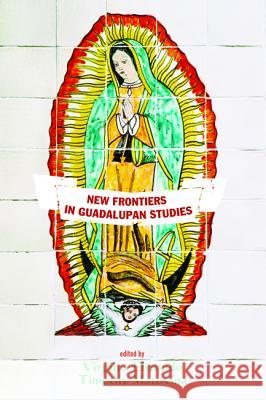New Frontiers in Guadalupan Studies » książka
New Frontiers in Guadalupan Studies
ISBN-13: 9781625642080 / Angielski / Miękka / 2014 / 170 str.
Historical writings on Our Lady of Guadalupe, the most revered sacred figure indigenous to the western hemisphere, have tended to focus on the sixteenth-century origins of her cult. But recent publications have increasingly extended Guadalupan studies beyond the origin debates to analyses of the subsequent evolution and immense influence of the Guadalupe tradition. New Frontiers in Guadalupan Studies significantly enhances this growing body of literature with insightful essays on topics that span the early stages of Guadalupan devotion to the milestone of Pope Benedict XIV establishing an official liturgical feast for Guadalupe in 1754. The volume also breaks new ground in theological analyses of Guadalupe, which comprise an ongoing effort to articulate a Christian response to one of the most momentous events of Christianity's second millennium: the conquest, evangelization, and struggles for life, dignity, and self-determination of the peoples of the Americas. ""This volume is an exciting contribution to the field of Guadalupan studies. Drawing from a variety of academic disciplines, the essays provide fascinating insights into the history, reception, development, and theological significance of Guadalupe."" --Roberto S. Goizueta, Margaret O'Brien Flatley Professor of Catholic Theology, Boston College, Chestnut Hill, MA ""The wide-ranging studies focus on the evolution of this tradition, while its authors, students in Matovina and Elizondo's doctoral seminar, are the next generation of theologians. New Frontiers in Guadalupan Studies is an invaluable contribution both in its content and structure."" --Michelle A. Gonzalez, Associate Professor of Religious Studies, University of Miami, Coral Gables, FL ""Drawing from the recent Guadalupan scholarship of historians, as well as integrating the fruit of contemporary Latina and Latino theologians, this much-needed interdisciplinary collection, like a good frontera, advances the frontiers of serious scholarship by taking seriously the faith of the people, exploring not only the origins of the devotion but also its evolution during the first two centuries of its appearance. This fruit of a seminar led by two top scholars, one a historian and the other a theologian, models well cutting-edge research, one which demonstrates that frontiers can be great places of creativity and encounter."" --Eduardo C. Fernandez, Jesuit School of Theology, Santa Clara University, Berkeley, CA Virgilio Elizondo is the Notre Dame Professor of Pastoral and Hispanic Theology and is widely acclaimed as ""the father of U.S. Latino religious thought."" Timothy Matovina is Professor of Theology and Executive Director of the Institute for Latino Studies at the University of Notre Dame. The seven authors of this volume were students in a doctoral seminar called ""Guadalupe: Faith, Theology, and Tradition"" that the editors team-teach at Notre Dame.
Historical writings on Our Lady of Guadalupe, the most revered sacred figure indigenous to the western hemisphere, have tended to focus on the sixteenth-century origins of her cult. But recent publications have increasingly extended Guadalupan studies beyond the origin debates to analyses of the subsequent evolution and immense influence of the Guadalupe tradition.New Frontiers in Guadalupan Studies significantly enhances this growing body of literature with insightful essays on topics that span the early stages of Guadalupan devotion to the milestone of Pope Benedict XIV establishing an official liturgical feast for Guadalupe in 1754. The volume also breaks new ground in theological analyses of Guadalupe, which comprise an ongoing effort to articulate a Christian response to one of the most momentous events of Christianitys second millennium: the conquest, evangelization, and struggles for life, dignity, and self-determination of the peoples of the Americas.""This volume is an exciting contribution to the field of Guadalupan studies. Drawing from a variety of academic disciplines, the essays provide fascinating insights into the history, reception, development, and theological significance of Guadalupe.""--Roberto S. Goizueta, Margaret OBrien Flatley Professor of Catholic Theology, Boston College, Chestnut Hill, MA""The wide-ranging studies focus on the evolution of this tradition, while its authors, students in Matovina and Elizondos doctoral seminar, are the next generation of theologians. New Frontiers in Guadalupan Studies is an invaluable contribution both in its content and structure.""--Michelle A. Gonzalez, Associate Professor of Religious Studies, University of Miami, Coral Gables, FL""Drawing from the recent Guadalupan scholarship of historians, as well as integrating the fruit of contemporary Latina and Latino theologians, this much-needed interdisciplinary collection, like a good frontera, advances the frontiers of serious scholarship by taking seriously the faith of the people, exploring not only the origins of the devotion but also its evolution during the first two centuries of its appearance. This fruit of a seminar led by two top scholars, one a historian and the other a theologian, models well cutting-edge research, one which demonstrates that frontiers can be great places of creativity and encounter.""--Eduardo C. Fernandez, Jesuit School of Theology, Santa Clara University, Berkeley, CAVirgilio Elizondo is the Notre Dame Professor of Pastoral and Hispanic Theology and is widely acclaimed as ""the father of U.S. Latino religious thought.""Timothy Matovina is Professor of Theology and Executive Director of the Institute for Latino Studies at the University of Notre Dame.The seven authors of this volume were students in a doctoral seminar called ""Guadalupe: Faith, Theology, and Tradition"" that the editors team-teach at Notre Dame.











